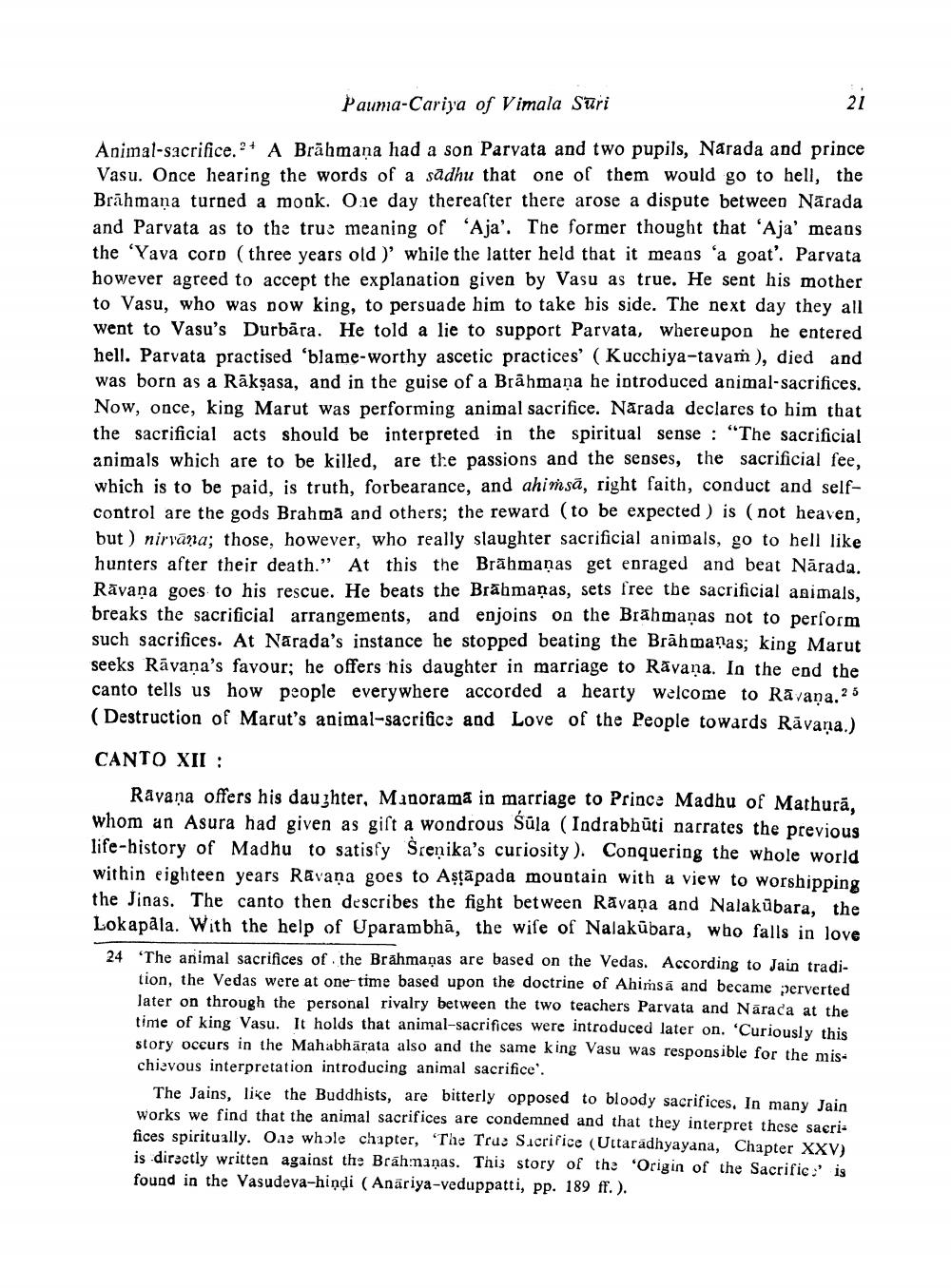________________
Pauma-Cariya of Vimala Sari
Animal-sacrifice. 24 A Brāhmana had a son Parvata and two pupils, Narada and prince Vasu. Once hearing the words of a sadhu that one of them would go to hell, the Brāhmana turned a monk. One day thereafter there arose a dispute between Närada and Parvata as to the true meaning of 'Aja'. The former thought that 'Aja' means the 'Yava corp (three years old )' while the latter held that it means 'a goat'. Parvata however agreed to accept the explanation given by Vasu as true. He sent his mother to Vasu, who was now king, to persuade him to take his side. The next day they all went to Vasu's Durbāra. He told a lie to support Parvata, whereupon he entered hell. Parvata practised 'blame-worthy ascetic practices' (Kucchiya-tavam), died and was born as a Rākşasa, and in the guise of a Brāhmaṇa he introduced animal-sacrifices. Now, once, king Marut was performing animal sacrifice. Narada declares to him that the sacrificial acts should be interpreted in the spiritual sense : "The sacrificial animals which are to be killed, are the passions and the senses, the sacrificial fee, which is to be paid, is truth, forbearance, and ahiṁsā, right faith, conduct and selfcontrol are the gods Brahma and others; the reward (to be expected ) is (not heaven, but ) nirvāna; those, however, who really slaughter sacrificial animals, go to hell like hunters after their death.” At this the Brāhmaṇas get enraged and beat Närada. Rāvana goes to his rescue. He beats the Brāhmaṇas, sets free tbe sacrificial animals, breaks the sacrificial arrangements, and enjoins on the Brāhmaṇas not to perform such sacrifices. At Narada's instance he stopped beating the Brāhmaṇas; king Marut seeks Rāvana's favour; he offers his daughter in marriage to Ravana. In the end the canto tells us how people everywhere accorded a hearty welcome to Ravana.2 5 (Destruction of Marut's animal-sacrifice and Love of the People towards Rāvana.) CANTO XII :
Ravana offers his daughter, Manorama in marriage to Prince Madhu of Mathură, whom an Asura had given as gift a wondrous Sūla (Indrabhūti narrates the previous life-history of Madhu to satisfy Sreņika's curiosity). Conquering the whole world within eighteen years Ravana goes to Astăpada mountain with a view to worshipping the Jinas. The canto then describes the fight between Ravana and Nalakūbara, the Lokapala. With the help of Uparambhā, the wife of Nalakübara, who falls in love 24 "The animal sacrifices of the Brahmaņas are based on the Vedas. According to Jain tradi
tion, the Vedas were at one-time based upon the doctrine of Ahimsa and became perverted later on through the personal rivalry between the two teachers Parvata and Nārada at the time of king Vasu. It holds that animal-sacrifices were introduced later on. 'Curiously this story occurs in the Mahabharata also and the same king Vasu was responsible for the mischievous interpretation introducing animal sacrifice.
The Jains, like the Buddhists, are bitterly opposed to bloody sacrifices, In many Jain works we find that the animal sacrifices are condemned and that they interpret these sacria fices spiritually. One whole chapter, 'The True Sacrifice (Uttaradhyayana, Chapter XXV) is directly written against the Brāhmaṇas. This story of the Origin of the Sacrific.' is found in the Vasudeva-hindi (Anäriya-veduppatti, pp. 189 ff.).




